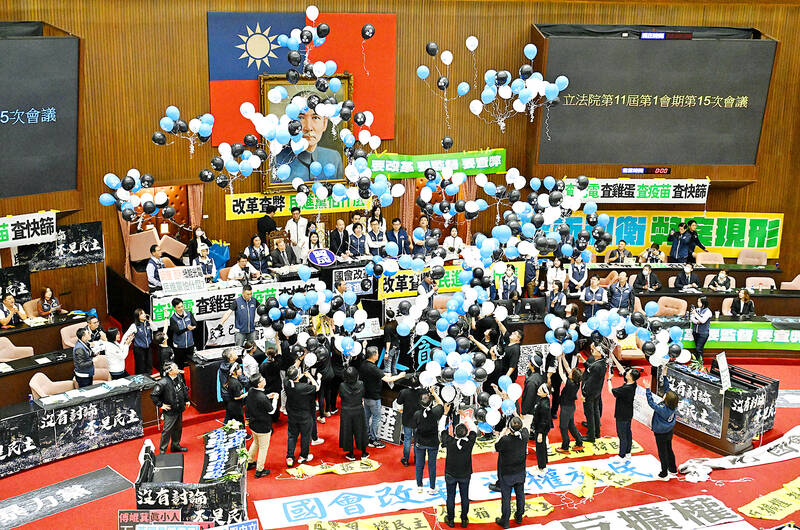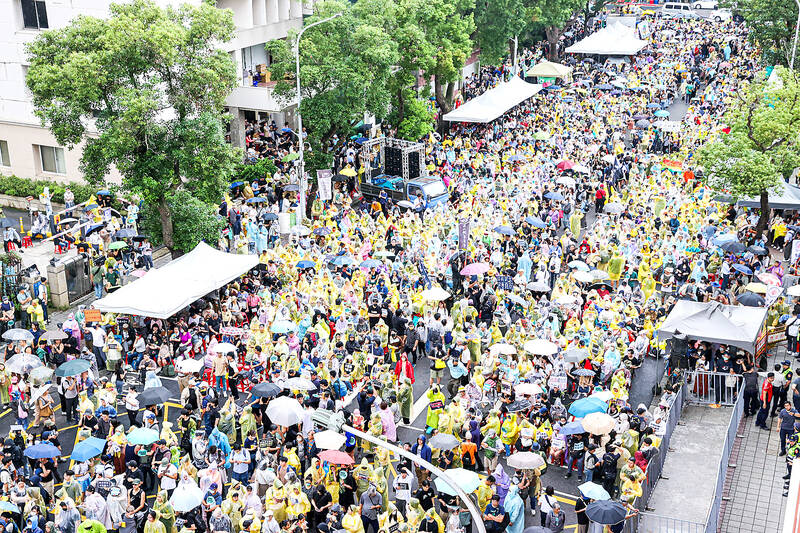The Legislative Yuan yesterday passed the second reading of amendments that would strengthen its investigative powers, while an estimated 100,000 people protested outside.
The amendments that were sent to the third and final reading include an article denying people compelled to testify before lawmakers as witnesses the right to legal counsel without permission from the investigation committee chairperson, as well as fines for those who refuse to appear before or answer questions at hearings.
The amendments would grant the Legislative Yuan formal “investigative powers,” in contrast to the existing law, which simply stipulates that lawmakers have the right to ask for documents from government agencies.

Photo: Liao Chen-huei, Taipei Times
Chinese Nationalist Party (KMT) and Taiwan People’s Party (TPP) lawmakers passed the amendments amid bitter opposition from the Democratic Progressive Party (DPP) and procedural battles that slowed the session to a crawl.
Deliberations were expected to continue until midnight and were still ongoing as of press time last night.
As of 9:30pm, about 100,000 people had gathered outside to protest the bills and non-transparent procedures, organizers said.

Photo: CNA
The Taipei Police Department sent 500 officers to establish a cordon between protesters and counter-protesters, a police spokesperson said.
The proposed amendments to the Criminal Code and the Act Governing the Legislative Yuan’s Power (立法院職權行使法) would give lawmakers the authority to launch investigations of officials and private entities.
The proposed change to Article 50 of the act would require a person or entity testify at the legislature as witness to submit a request with the chairperson of the investigative committee to allow legal counsel during their hearing.
The amendments that lawmakers passed yesterday stipulate that government officials must testify truthfully at hearings or face impeachment or reprimands to be determined by a vote at the legislature, and they may be prosecuted for offense in the Criminal Code.
Those whose presence is requested cannot, without legitimate reason, be absent, refuse to answer, refuse to provide testimony or designated materials.
Legitimate reasons include if the matter in question relates to state secrets relating to national defense, security and foreign relations.
Other reasons for non-compliance can include when the questions go beyond the purpose of the hearings or pertain to personal privacy or secrets that should be protected in accordance with existing laws.
Those in violation of said requirements — with the approval of the legislature — would be fined between NT$10,000 and NT$100,000, with repeated fines possible.
If statements provided by related individuals asked to provide testimony are found to be false, those persons could be fined between NT$20,000 and NT$200,000 with the approval of the legislature.
According to the amendments, an official is declared to be making false statements if five members of an investigative committee support the accusation by petition or motion followed by a general vote.
The proposed changes include a provision for secret hearings if the legislature’s probe touches on state secrets, commercial secrets, matters of personal privacy, or information whose publication could endanger a person’s life or bodily safety.
These secret hearings can be partially or wholly classified, and legislators are obliged to protect any sealed information, the proposed amendments to Article 59 of the Act Governing the Legislative Yuan’s Power read.
Legislative Yuan committees and investigative task forces may hold hearings to impeach the president and vice president, or exercise the legislature’s right to approve the appointment of officials, the amendments said, citing Article 67 of the Constitution.
Hearings are authorized at the consent of the chairperson or a third of the members of the Legislative Yuan’s Committee of the Hull House, standings and ad hoc committees, investigative committees and investigative task forces, they read.
The lawmakers began the day at 5:30am and began jostling for control of the doors to the chamber and the podium in a chaotic scene, with a fistfight erupting between DPP Legislator Lin Shu-fen (林淑芬) and TPP Legislator Mai Yu-chen (麥玉珍).
The KMT and TPP legislators pushed their DPP counterparts from the podium at about 10am and began passing the amendments article by article.
DPP legislators chanted that the votes were being held illegally via a “procedural black box” and that the day’s session should be nullified, while KMT lawmakers chanted that DPP members were sore losers and that legislative reforms were necessary.
Later in the evening, DPP lawmakers released blue, white and black balloons to represent the Legislative Yuan being haunted by “the specter of of KMT, TPP and black box procedures.”
DPP caucus whip Ker Chien-ming (柯建銘) said that proceedings over the past days allowed Chinese President Xi Jinping (習近平) to declare “martial law” over the nation’s Legislative Yuan in “a death knell for the legislature.”
DPP Legislator Fan Yun (范雲) said the proposals amount to giving lawmakers the power to summon Taiwanese at will while stripping those being questioned of their right to remain silent or have a lawyer.

Conflict with Taiwan could leave China with “massive economic disruption, catastrophic military losses, significant social unrest, and devastating sanctions,” a US think tank said in a report released on Monday. The German Marshall Fund released a report titled If China Attacks Taiwan: The Consequences for China of “Minor Conflict” and “Major War” Scenarios. The report details the “massive” economic, military, social and international costs to China in the event of a minor conflict or major war with Taiwan, estimating that the Chinese People’s Liberation Army (PLA) could sustain losses of more than half of its active-duty ground forces, including 100,000 troops. Understanding Chinese

The Ministry of Foreign Affairs (MOFA) yesterday said it is closely monitoring developments in Venezuela, and would continue to cooperate with democratic allies and work together for regional and global security, stability, and prosperity. The remarks came after the US on Saturday launched a series of airstrikes in Venezuela and kidnapped Venezuelan President Nicolas Maduro, who was later flown to New York along with his wife. The pair face US charges related to drug trafficking and alleged cooperation with gangs designated as terrorist organizations. Maduro has denied the allegations. The ministry said that it is closely monitoring the political and economic situation

UNRELENTING: China attempted cyberattacks on Taiwan’s critical infrastructure 2.63 million times per day last year, up from 1.23 million in 2023, the NSB said China’s cyberarmy has long engaged in cyberattacks against Taiwan’s critical infrastructure, employing diverse and evolving tactics, the National Security Bureau (NSB) said yesterday, adding that cyberattacks on critical energy infrastructure last year increased 10-fold compared with the previous year. The NSB yesterday released a report titled Analysis on China’s Cyber Threats to Taiwan’s Critical Infrastructure in 2025, outlining the number of cyberattacks, major tactics and hacker groups. Taiwan’s national intelligence community identified a large number of cybersecurity incidents last year, the bureau said in a statement. China’s cyberarmy last year launched an average of 2.63 million intrusion attempts per day targeting Taiwan’s critical

AGING: As of last month, people aged 65 or older accounted for 20.06 percent of the total population and the number of couples who got married fell by 18,685 from 2024 Taiwan has surpassed South Korea as the country least willing to have children, with an annual crude birthrate of 4.62 per 1,000 people, Ministry of the Interior data showed yesterday. The nation was previously ranked the second-lowest country in terms of total fertility rate, or the average number of children a woman has in her lifetime. However, South Korea’s fertility rate began to recover from 2023, with total fertility rate rising from 0.72 and estimated to reach 0.82 to 0.85 by last year, and the crude birthrate projected at 6.7 per 1,000 people. Japan’s crude birthrate was projected to fall below six,